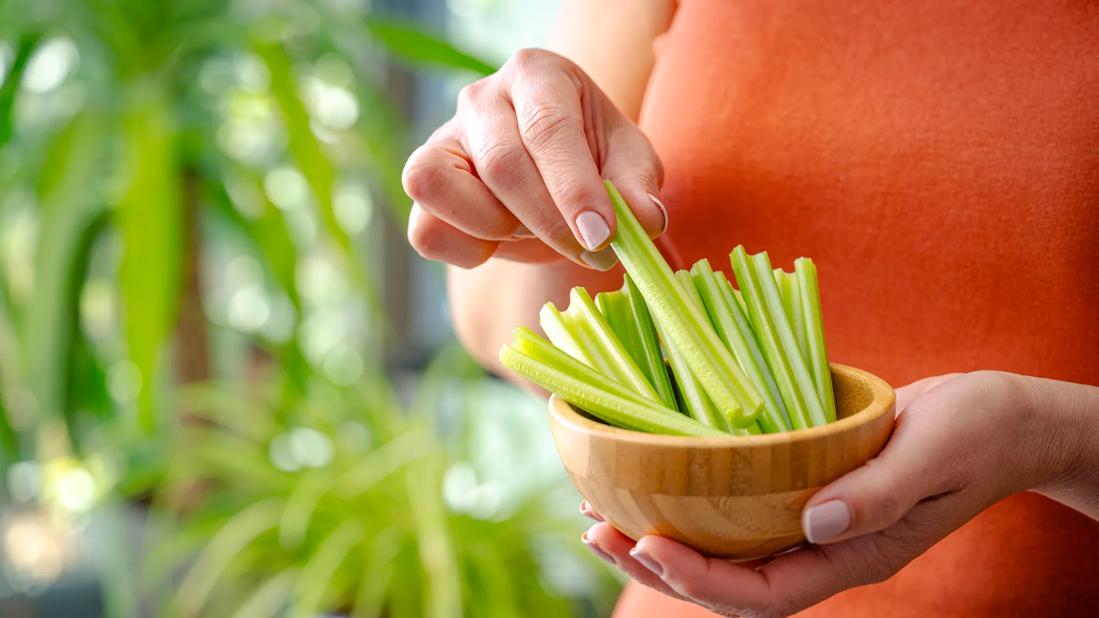Nutrients, antioxidants and water in celery help your heart and gut while keeping you hydrated

Image content: This image is available to view online.
View image online (https://assets.clevelandclinic.org/transform/be527af8-6a61-4111-adff-4c0cd5936ccf/celery-2213158018)
Person holding a wooden bowl of celery sticks
With its U-shaped stalks, celery is the perfect vessel for peanut butter, cream cheese and all types of dips. This crunchy vegetable is also a great addition to salads, soups, casseroles and, of course, stuffing. Whether you like celery raw and crunchy or softened from cooking, this vegetable provides a host of health benefits.
Advertisement
Cleveland Clinic is a non-profit academic medical center. Advertising on our site helps support our mission. We do not endorse non-Cleveland Clinic products or services. Policy
“Celery is a low-calorie vegetable that provides much-needed nutrients, water and some fiber,” says registered dietitian Amber Sommer, RDN, LD.
The nutritional value of celery depends on how you eat it. For instance, fresh, raw celery has more nutrients than cooked celery.
One cup of raw chopped celery has:
Here’s how the humble veggie can benefit your health.
The low sodium content of celery makes it a good choice if you have high blood pressure or cardiovascular disease. The stalks are also high in micronutrients that protect your heart and help keep high blood pressure in check.
Celery has:
Plant-based flavonoids, phytonutrients and polyphenols in celery provide antioxidant benefits. Studies suggest that antioxidants may prevent inflammation that contributes to blood clots, heart disease and hardening of the arteries (atherosclerosis).
Advertisement
“Antioxidants protect against free radicals that can damage cells and tissues, causing inflammation,” adds Sommer.
While chomping on crunchy, low-sugar vegetables like celery isn’t the same as flossing, it does help remove food particles from your teeth. Plus, your teeth have to work hard to break down celery fibers. All this chewing stimulates saliva, which neutralizes bacteria that cause cavities.
“Celery isn’t a replacement for flossing and brushing,” states Sommer. “But eating celery may protect oral health until you can take those steps.”
Celery also has:
Celery has 30 micrograms of vitamin K (approximately 30% of your daily value or DV). This vitamin aids blood clotting and helps build strong bones.
Celery also has folate, a B vitamin that helps red blood cells mature. Folate is also important for cell division, growth and development, especially during pregnancy.
With less than 1 gram of fiber in an eight-inch stalk, celery isn’t exactly a fiber powerhouse, but even this small amount can help. Celery root, the knobby end of the plant, has the most fiber. And most of the fiber in celery is insoluble, which means it sticks to other matter to form stool.
“This fiber bulks up stool, making it easier to pass and preventing constipation,” explains Sommer.
Celery also has certain complex carbs that your body can’t digest. They ferment in the large intestine, promoting a healthy digestive tract and improved gut health.
Celery is 95% water, which makes it a good option for preventing dehydration during hot summer months or after exercise. You can also quench your thirst by infusing celery in water or with celery juice. Keep in mind that juicing removes much of the fiber in celery, so you’ll miss out on those benefits.
Celery adds flavor to many dishes. You can:
Some people experience oral allergy syndrome after eating raw celery.
“If you have this allergy, your lips or throat may tingle or swell minutes after you eat the vegetable,” reports Sommer.
This allergic reaction is due to a protein in celery that’s similar to one found in birch tree pollen. People with birch-pollen allergies are more likely to have similar reactions to apples, bananas and pears. The protein breaks down when you cook celery, making it OK to eat.
Advertisement
“Celery is generally safe to eat and good for you,” reinforces Sommer.
Advertisement

Sign up for our Health Essentials emails for expert guidance on nutrition, fitness, sleep, skin care and more.
Learn more about our editorial process.
Advertisement
Pick bell peppers to help fight cancer, memory decline and joint pain
The tropical fruit is a good source of antioxidants and vitamin C
High amounts of cholesterol and saturated fat in red meat may be linked to heart disease
The leaves and pods from this tree are rich in essential nutrients
This starchy root vegetable is a staple in many global cuisines — but it has to be prepared correctly, or it can cause serious concerns
These delicate green sprouts can give you an extra dose of vitamin K and other nutrients — but they’re not safe for everyone
Edamame, lentils and chicken breast are good sources of protein
Eating this root vegetable can help support your eye, heart and brain health
Prioritize your health by managing stress, strengthening your social connections and getting quality sleep
Bolsters, blankets, pillows and blocks can offer extra support, stability and comfort
Allergies, postnasal drip, asthma or reflux could be to blame for a cough that won’t quit